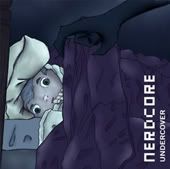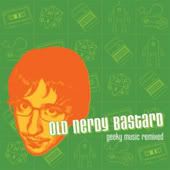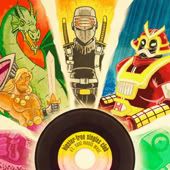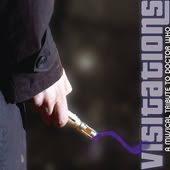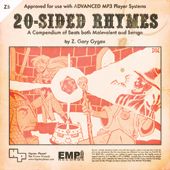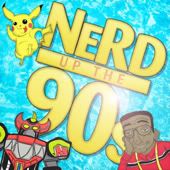I am, for lack of a better term, domesticated. Unlike the bulk of my fellow bloggers, freaks and fanboys, I am married with a couple of kids, and that in itself often defines what I do and when I do it. Because of this, the bulk of my writing and researching is done in the later evening hours, while the other members of the House of Z. slumber.
It's a quiet time during which I attempt to catch up on my Twitter and follow up on all those great links that came through my feed during the preceding day. So imagine my surprise when last night, around 10 o'clock EST, the entire world was engulfed in a column of flame!
Okay, perhaps I overstate.
So imagine my surprise when last night, around 10 o'clock EST, the nerdospehere exploded in a fiery rage!
Much better.
The source of this wailing and gnashing of teeth was, to say the least, a little unexpected. MC Lars had, in a blog post entitled "
RIP NERDCORE (1998-2009)," seemingly decried not only the bulk of his fellow artists but nerdcore in general.
Scandalous!Now before I carry this missive further, I must pause to say that I know Lars. We aren't exactly on each other's Christmas card list or anything, but we've talked extensively both online and in person to a point that I feel like I am fairly familiar with him. Familiar enough, at least, to know that he isn't exactly the kind of cat to pick fights.
Armed with this knowledge, I took his musings – from the very incendiary point at which he states "Unless you are MC Frontalot, it's time to stop trying to make 'nerdcore hip-hop'" – to be something less than most. I refused to see it as attack, which is how it was apparently perceived by many of those who passed the link my way, but rather as Lars expressing dissatisfaction with his perception of what nerdcore is versus what hip-hop should be.
Lars illustrates this point by referencing a number of outstanding examples of from the greater nerdcore schema, including personal favorites like int eighty and Jesse Dangerously, unfortunately he also muddies the waters with arguments that, at times, come through as something far less than sound.
From early on, Lars equates Frontalot's success and the media attention attracted by the scene's twin documentaries with a moment at which "a cadre of mediocre rappers" actively sought to exploit these breakthroughs as their own personal marketing megaphone. I take issue with this statement on a couple of levels.
First, it's painful to admit, but Lars himself has been faced with similar accusations. I admire Lars as a businessman, a lyricist and a performer, but his style of "Post-Punk Laptop Rap" has likewise been decried by more traditional heads as being insincere and incongruent.
We know that Lars is a genuine fan of hip-hop that has been doing his thing for far longer than the term "nerdcore" was a Google trend, but many of those outside our admittedly limited window do not. Whether or not Lars considered that before pinning that particular barb is something that only the man himself can answer, but it's a fact that makes the admonition seem a little catty.
Secondly, it seems to actively discount those outside of the nerdcore artist corral that felt as though the "movement," for lack of a better word, provided a soundtrack to their lives. It's easy to see nerdcore as a whole as a group of cannibalistic, ego-stroking artists simply making music for the sake of garnering the attention of their fellows, but there are actual fans. I know. I am one of them. And to those like me, the media micro-explosion that was nerdcore's moment in the sun was simply another minor victory for supporters of nerdom as a culture unto itself. It was a music that celebrated us, and while it certainly wasn't all as compelling as YTCracker, its brief ascension was a point of pride.
Alternately, Lars also parallels the stripped-down punk rock aesthetic of the Ramones and the Sex Pistols with the more refined and ultimately evolved brand of post-punk created by acts like Joy Division. It's a sound enough challenge to motivate artists to push themselves creatively, at least on the surface. In fact, normally this is the kind of sentiment I could get behind, but knowing that Lars and I both come from a similar punk background, I would be remiss if I didn't ask: What of The Clash? What of Blondie and Elvis Costello and Television? What of The New York Dolls and The Stooges and Velvet Underground? What of The Jam?
Each of these artists, rather rightly or wholly inaccurately, was at one time or another lumped under the punk rock label. Despite the various hues or flavors of their individual brands of musical revolution, they were pinned with that same tack. And yet they were all undeniably different. Moreover, each was party to a continually shifting paradigm. Each was an agent of slow and steady change: an evolutionary step.
This brings me to my two main points of criticism.
Labels, particularly genre labels, are inherently erroneous. Fort those truly involved in the scenes themselves they are at best limiting (as Lars points out) and a worst insulting. And yet they persist. As someone who actively uses these relatively inflexible pigeonholes in an attempt to broaden the nerdy music user base, I am the first to admit that there really is no proper cataloging method. When I play a Selfhelp or an I Fight Dragons track on
Radio Free Hipster, I can do so with little pretense. Yet when I play the same on my
Wired.com podcast, I am beholden to state their proximity to arbitrary labels like nerdcore or geek rock or chiptunes. I don't do it as a disservice to the artists or because these "genre tags" magically make their music more relevant, but because man is a simple creature who needs an easy place to hang his hat. That doesn't make it right, but that does illustrate the concept's functionality.
Also, just as he omits acts that I
know he knows in his punk rock allusion, Lars similarly glosses over a significant chunk of applicable MCs that I fear he perhaps doesn't in his treatise on nerdcore. Whore Moans, The Ranger, Grandmaster Pink, MadHatter, Navi and Super Dragon X are not new to hip-hop. These are cats who were making beats and recording rhymes (with varying levels of nerdy slant) without the insulation of a nerdcore "scene," but who used the loose affiliation that sprang up in the wake of
Rhyme Torrents and
Nerdcore For Life to find similar, like-minded artists. At times many of them have expressed their own dissatisfaction with the direction of the scene, but their collective antidote has been to make their own shit that much more dope.
Lars calls for something new, and I applaud that challenge. But I do so with the caveat that there is continually new hotness springing up, even from the nerdcore faithful. The drum that I so often beat (which I'll now remove from its protective sleeve and tighten properly) is that we need to stop thinking of nerdcore as a genre, or even a subgenre. That truly is
Front's gig, and he plays it perfectly. It's his term that the rest of us are using by his good grace, so let's tread lightly.
For everyone else, nerdcore should be seen as a community or, better yet, a
style.
As principle nerdcore artists, folks like my pal Beefy, further hone their skills we see the term nerdcore morph from a shield to a banner. For those who continue to ply their craft, nerdcore – which once protected them in their handsome little niche – can instead turn into a word of their own precise defining. There is always wiggle room. As more and more of those in the meta-community find their voices, nerdcore becomes less crutch than buzzword. Does that mean it will ever afford a totally accurate description of everyone from mCRT to KABUTO? No, but such is the price we pay for being habit-hardened creatures of limited language.
Even now, I find myself surprised to hear guys like Random, a true underground artist with hip-hop chops to spare, talk about his nerdcore project
Mega Ran. Further, I was positively taken aback when Dr. Awkward (rightfully) proclaimed himself the next generation of nerdcore in his
recent release. This just goes to show that, when used correctly, the term has legs. Even in the face of its apparent stylistic limitations.
In the end, I can't help but think that I agree with Lars's sentiment but not his verbiage. I know the rationale for this post wasn't to shock or offend, and I am not at all surprised that Lars has
softened his stance. He's a great guy and a genuine talent who simply wants to encourage artistic experimentation and creative fulfillment. And there's really no loftier goal.
I do, however, think that he hastily glosses over one of his best points; if you want to be a rapper, listen to rap. I regularly hear "Yeah, nerdcore is the only rap I like" from artists and fans alike, and my response is always that this is a damn shame. Hip-hop is a rich and colorful culture that is not wholly defined by whatever may make its way into the mainstream.
In fact, my principle beef with the prevailing nerdcore mindset is that by rapping about the day-to-day of nerd life we are somehow the saving grace of hip-hop. That's just ridiculous! There's nothing wrong with the aforementioned concept – holler at
P.Nis for more info – but the truth is rap doesn't need to be saved, and it surely couldn't be saved by a bunch of outsiders. Hip-hop, like any other culture (including our own), has been strip-mined for marketability, its adherence reduced to a handsome subset of demographic info on some spreadsheet. But hip-hop is more than bad radio edits and McDonald's commercials. It's a living, breathing, beautiful thing.
While we seek to cultivate the culture of nerd, we shouldn't be looking – as the mainstream does – for elements to hijack or assimilate, but for models upon which to base our own design. And if we are going to use hip-hop as a part of our musical shorthand, we should certainly delve further into its own history and development. Not only are we apt to find more music to our liking, but we'll also discover stabilizing elements like its traditional fundamentals and genuine sense of cultural stewardship. Hip-hop is, like all the finer things, a subject that requires study; why not turn some of our trademark studiousness to that end?
So I suppose the only item left to tackle is Lars's own principle point: the blight of bad music. Is there ever an excuse to make shitty music?
To tackle this we must first admit that our own unique opinions are not an indelible stamp of quality. I fight a daily struggle with this concept, as I am regularly reminded that just because
I like something doesn't immediately make it good. But if we look at things objectively, we must realize that art exists, on some level, to be experienced, and it is the job of the artist to make that experience as compelling and creative as possible. There are many paths to quality, but what matters is that the end product amuses or, better yet, enlightens the listener.
So I'll simply hope (for my sake as much as anyone's) that shitty music or writing or podcasting or what-have-you is justifiable in the continued pursuit of artistic evolution. Because that is what it's all about. To quote the man himself, "Let's push ourselves outside of our comfort zones and flip the script by surprising each other with what we can do."
In the end, I suppose it comes down to a matter of audience. If we are producing art for the celebration of a limited community, we can always take the easy way out. We can toss together any old goddamn thing we like without regard for quality or relevant content and tell detractors that they simply don't understand where we're coming from. Or we can continue to work to better ourselves for the sake of our craft, and attempt to make the most compelling rap song/vector art/Bundt cake/web log that we possibly can. Sure, the first option is easier (not to mention relatively bullet-proof), but, whether your audience is 10 or 10,000, it's important to remember that excellence is often relative while mediocrity is nigh undisputed.





